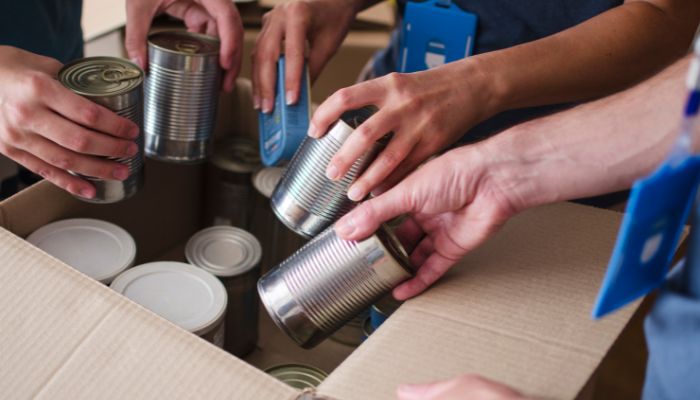During the onslaught of Hurricane Idalia in Florida, the Department of Children and Families (DCF) has made a significant announcement regarding the Supplemental Nutrition Assistance Program (SNAP). In a proactive measure to aid eligible households in select counties, DCF has initiated the early release of SNAP benefits.
This step is intended to help those vulnerable households, enabling them to make necessary preparations for the impending storm and to address any food losses incurred in its aftermath. Under this exceptional early payment, food stamps beneficiaries for the month of September 2023 will receive their benefits ahead of schedule. Specifically, households that typically receive their SNAP benefits between the 1st and 14th of September will now obtain these essential funds in advance.
SNAP resources to be delivered early in Florida due to the emergency
Recipients of SNAP benefits may be confused during these difficult times, and you don’t always know what to do about it. For everyone’s peace of mind, The Department of Children and Families has streamlined the process, ensuring that the funds are seamlessly added to their Electronic Benefit Transfer (EBT) cards. That means that there’s no need to do any further request, paperwork or procedure to get the money earlier.

Indeed, the food stamps money has already started to be sent to beneficiaries, starting from August 29, and so on until the last one of the households get their resources to prepare for the storm. In the lead-up to Hurricane Idalia, the Department of Children and Families (DCF) is strongly encouraging SNAP recipients to prioritize the purchase of non-perishable items. It is of critical importance to ensure that households have an adequate supply of food that can withstand potential power outages and extended periods of emergency conditions. Non-perishable items, which include canned goods, dry grains, and other long-lasting staples, are ideally suited for these situations.
SNAP recipients to get early food stamps must reside within these counties
SNAP recipients in the following counties will receive their benefits early: Alachua, Baker, Bay, Bradford, Brevard, Calhoun, Charlotte, Citrus, Clay, Collier, Columbia, DeSoto, Dixie, Duval, Flagler, Franklin, Gadsden, Gilchrist, Gulf, Hamilton, Hardee, Hernando, Hillsborough, Jefferson, Lafayette, Lake, Lee, Leon, Levy, Liberty, Madison, Manatee, Marion, Nassau, Osceola, Orange, Pasco, Pinellas, Polk, Putnam, Sarasota, Seminole, St. Johns, Sumter, Suwannee, Taylor, Union, Volusia, and Wakulla counties.
If you have any further questions or doubts, do not hesitate to get in touch with Florida DFC’s Disaster Distress Helpline at 1-800-985-5990. They will kindly help you during this harsh times.
Non-perishable food items and why are they important during emergency conditions?
Non-perishable food items, as defined by various sources like Healthline and Biophytopharm, refer to foods that have a long shelf life and don’t require refrigeration or freezing to maintain their quality and safety. They are typically packaged in cans, jars, or boxes and can be stored for extended periods. Examples of non-perishable foods include canned goods, dried fruits, pasta, rice, beans, juice boxes, powdered milk, crackers, granola bars, and trail mix.
There are numerous reasons why non-perishable foods are important, especially during emergency situations:
- Long Shelf Life: Non-perishable foods can be stored for a long period without spoiling, making them ideal for stocking up for emergencies or natural disasters.
- Convenience: These foods require little to no preparation and can be eaten straight out of the package, providing a quick and easy meal option.
- Cost-Effective: Non-perishable foods can be purchased in bulk and stored for extended periods, reducing the need for frequent grocery trips and minimizing food waste.
- Emergency Preparedness: In situations like power outages, natural disasters, or public health crises that require self-quarantine, having a supply of non-perishable foods is crucial.
What is Florida DFC’s Disaster Distress Helpline and how can it help?
The Disaster Distress Helpline (DDH) is a national hotline dedicated to providing year-round disaster crisis counseling. This toll-free, multilingual, crisis support service is available 24/7 to all residents in the U.S. and its territories who are experiencing emotional distress related to natural or human-caused disasters.
The helpline provides various services including:
- Crisis counseling for people in emotional distress related to any natural or human-caused disaster.
- Information on how to recognize distress and its effects on individuals and families.
- Referrals to local crisis call centers for additional follow-up care and support.
All calls and texts to the DDH are confidential and free. Trained counselors from a network of crisis call centers located across the United States staff the helpline.
The helpline is also accessible to the Deaf and Hard of Hearing ASL callers who can connect directly to an agent in American Sign Language.